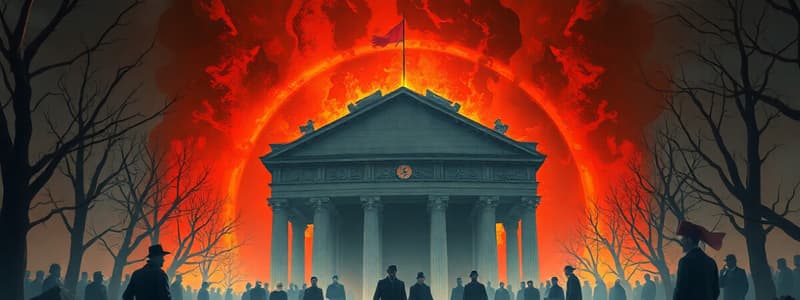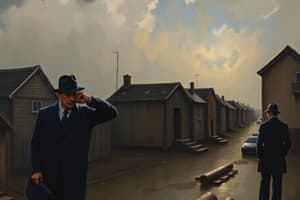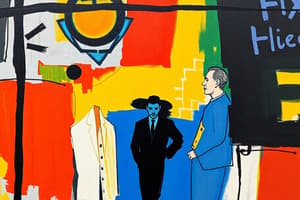Podcast
Questions and Answers
What does the term 'Holocaust' mean?
What does the term 'Holocaust' mean?
- Religious cleansing
- Removal of cultural artifacts
- Sacrifice by fire (correct)
- Mass extermination of political dissidents
Which event is noted as one of the first violent acts of antisemitism?
Which event is noted as one of the first violent acts of antisemitism?
- Destruction of the Jerusalem temple (correct)
- Black Plague accusations
- Holocaust
- Formation of Weimar Republic
What role did Emperor Constantine play in the history of antisemitism?
What role did Emperor Constantine play in the history of antisemitism?
- Built the first Jewish temple
- Called Jews enemies of Romans (correct)
- Established Jewish synagogues
- Promoted Jewish rights
What was the Weimar Republic?
What was the Weimar Republic?
What role did Paul von Hindenburg play in Hitler's rise to power?
What role did Paul von Hindenburg play in Hitler's rise to power?
Which event directly helped Hitler eliminate opposition to his rule?
Which event directly helped Hitler eliminate opposition to his rule?
Which accusation against Jews was NOT propagated by the Romans?
Which accusation against Jews was NOT propagated by the Romans?
What was the societal status of Jews in the Roman Empire following the establishment of Christianity as the official religion?
What was the societal status of Jews in the Roman Empire following the establishment of Christianity as the official religion?
What was a significant outcome of the Reichstag fire?
What was a significant outcome of the Reichstag fire?
What was the role of the Chancellor in the Weimar Republic?
What was the role of the Chancellor in the Weimar Republic?
What significant impact did the Treaty of Versailles have on Germany?
What significant impact did the Treaty of Versailles have on Germany?
How did the Christian Church contribute to antisemitism?
How did the Christian Church contribute to antisemitism?
What was the intended effect of the majority rule established under German law during Hitler's regime?
What was the intended effect of the majority rule established under German law during Hitler's regime?
What characterization is commonly associated with the term 'Lebensraum'?
What characterization is commonly associated with the term 'Lebensraum'?
Who was Ernst Röhm and what risk did he pose to Hitler?
Who was Ernst Röhm and what risk did he pose to Hitler?
What was the significance of Dachau concentration camp when it opened in 1933?
What was the significance of Dachau concentration camp when it opened in 1933?
What was the main consequence of Hitler ordering the murder of the top SA officers on June 30, 1934?
What was the main consequence of Hitler ordering the murder of the top SA officers on June 30, 1934?
What significant change occurred when Hitler combined the roles of President and Chancellor?
What significant change occurred when Hitler combined the roles of President and Chancellor?
What were the Nuremberg Laws primarily aimed at?
What were the Nuremberg Laws primarily aimed at?
What does Kristallnacht refer to?
What does Kristallnacht refer to?
What was the basis of the Munich Agreement in 1938?
What was the basis of the Munich Agreement in 1938?
What was the purpose of the non-aggression pact between Germany and the USSR?
What was the purpose of the non-aggression pact between Germany and the USSR?
What was the significance of the term 'Judenrein'?
What was the significance of the term 'Judenrein'?
What region did Germany annex in 1937 under the concept of 'Lebensraum'?
What region did Germany annex in 1937 under the concept of 'Lebensraum'?
What was the primary role of the president in the Weimar Republic?
What was the primary role of the president in the Weimar Republic?
What ideological position did Adolf Hitler adopt during his time in Vienna?
What ideological position did Adolf Hitler adopt during his time in Vienna?
During which event did Hitler attempt his first coup?
During which event did Hitler attempt his first coup?
What was the original name of the National Socialist German Workers' Party?
What was the original name of the National Socialist German Workers' Party?
What significant work did Hitler write during his imprisonment?
What significant work did Hitler write during his imprisonment?
What was the SA, also known as 'Brownshirts', formed to do?
What was the SA, also known as 'Brownshirts', formed to do?
What happened to Hitler after the failed Munich Beer Hall Putsch?
What happened to Hitler after the failed Munich Beer Hall Putsch?
What kind of government system did the Weimar Republic have?
What kind of government system did the Weimar Republic have?
Flashcards
What is the Holocaust?
What is the Holocaust?
The systematic, bureaucratic, state-sponsored persecution and murder of six million Jews by the Nazi regime and its collaborators.
What is Antisemitism?
What is Antisemitism?
Antisemitism is prejudice, discrimination, or hostility directed at Jews.
How did the Roman Empire contribute to antisemitism?
How did the Roman Empire contribute to antisemitism?
The Roman Empire used violence against Jews in 63 BCE to force them to convert to Roman polytheism.
How did the early Christian Church contribute to antisemitism?
How did the early Christian Church contribute to antisemitism?
Signup and view all the flashcards
What was the Weimar Republic?
What was the Weimar Republic?
Signup and view all the flashcards
How did the Treaty of Versailles contribute to the rise of Hitler?
How did the Treaty of Versailles contribute to the rise of Hitler?
Signup and view all the flashcards
How did the Weimar Republic's failure affect Germany?
How did the Weimar Republic's failure affect Germany?
Signup and view all the flashcards
How did Hitler rise to power in Germany?
How did Hitler rise to power in Germany?
Signup and view all the flashcards
Weimar Republic Government
Weimar Republic Government
Signup and view all the flashcards
Proportional Representation in Weimar Republic
Proportional Representation in Weimar Republic
Signup and view all the flashcards
President's power in Weimar Republic
President's power in Weimar Republic
Signup and view all the flashcards
Weimar Chancellor
Weimar Chancellor
Signup and view all the flashcards
Nazi Party
Nazi Party
Signup and view all the flashcards
Mein Kampf
Mein Kampf
Signup and view all the flashcards
SA (Brownshirts)
SA (Brownshirts)
Signup and view all the flashcards
Munich Beer Hall Putsch
Munich Beer Hall Putsch
Signup and view all the flashcards
Führer
Führer
Signup and view all the flashcards
SS
SS
Signup and view all the flashcards
Heinrich Himmler
Heinrich Himmler
Signup and view all the flashcards
Nuremberg Laws
Nuremberg Laws
Signup and view all the flashcards
Kristallnacht
Kristallnacht
Signup and view all the flashcards
Judenrein
Judenrein
Signup and view all the flashcards
Anschluss
Anschluss
Signup and view all the flashcards
Sudetenland
Sudetenland
Signup and view all the flashcards
Reichstag
Reichstag
Signup and view all the flashcards
Article 48
Article 48
Signup and view all the flashcards
President of the Weimar Republic
President of the Weimar Republic
Signup and view all the flashcards
Chancellor of the Weimar Republic
Chancellor of the Weimar Republic
Signup and view all the flashcards
Lebensraum
Lebensraum
Signup and view all the flashcards
Dachau
Dachau
Signup and view all the flashcards
Ernst Röhm
Ernst Röhm
Signup and view all the flashcards
Night of the Long Knives
Night of the Long Knives
Signup and view all the flashcards
Study Notes
Section 1
-
Holocaust Definition: A Greek word meaning "sacrifice by fire," the Holocaust during WWII targeted Jews, deeming them racially inferior and a threat.
-
Antisemitism History: Antisemitism dates back to ancient times. The Roman Empire, particularly under Constantine, played a role by turning against Jews, and blaming them for issues like the Black Death. Christians distanced themselves from the Jews, accusing them of crimes and misdeeds. This led to discrimination and violence against Jews.
Section 2
-
Weimar Republic: The German government from World War I until the start of World War II. Facing massive debt and hyperinflation, the Republic had a legislative, executive, and judicial branch. Power was vested in parties rather than individuals
-
Adolph Hitler: Born in Austria, Hitler moved to Vienna as an artist. Rejected by the art academy, he became antisemitic and joined the German army during WWI. He rose to power by forming the Nazi party, culminating in his failed Beer Hall Putsch in 1923. This led to his imprisonment and writing of Mein Kampf.
Section 3
-
National Socialist German Workers' Party (Nazi Party): The full name of the Nazi Party, committed to the removal of Jews from Germany.
-
SA (Brownshirts): The Nazi Party's private army, growing to 400,000 members by 1932.
-
Munich Beer Hall Putsch (1923): Hitler's failed attempt to seize power through a coup.
-
Mein Kampf: Hitler's manifesto, outlining his antisemitic views and plans for a lasting German Empire, promoting German supremacy.
Section 4
-
Paul von Hindenburg: President of Germany, who passed Article 48, allowing the Chancellor to bypass the legislature in cases of emergency. Played a crucial role in Hitler's rise to power and died in August 1934.
-
Reichstag: The German Legislature. The Reichstag Fire of 1933, while its origin remains uncertain, was used by Hitler to suppress opposition and remove legal/constitutional protections.
-
President (Weimar Republic): The leader, who controlled the military and could dismiss the Reichstag, making new elections if needed and appointing the Chancellor.
-
Chancellor (Weimar Republic): The president appointed the chancellor, responsible for daily government operations.
Section 5
-
Volk: German word for "people."
-
Lebensraum: German word for "living space."
-
Third Reich: Hitler's name for the new German Empire, seeking to expand German territory and dominance.
-
Dachau: The first concentration camp, opening in 1933. Primarily used to imprison political opponents like Communists.
-
German Law and Legal System (Purpose): The goal was to disempower certain groups, primarily Jews and minorities, enabling their persecution and disenfranchisement.
Section 6
-
Ernst Röhm: Commander of the SA, Hitler's potential rival and a prominent figure in the Night of Long Knives. Eliminated and killed on June 30, 1934.
-
Night of the Long Knives: June 30, 1934, Hitler ordered the mass murder of top SA leaders, using the rising threat of the SA to create a more loyal and subservient military.
-
Fuhrer and Reichschancellor: Hitler combined the roles of president and chancellor, solidifying his absolute power as Fuhrer, and making German laws contingent on his pronouncements.
-
SS: Hitler's elite bodyguard force, responsible for protection and becoming a paramilitary force under Heinrich Himmler.
Section 7
-
Heinrich Himmler: Commander of the SS, second in power to Hitler.
-
Nuremberg Laws: 1935 laws stripping Jews of their German citizenship, forbidding intermarriage, and dictating occupations deemed permissible. The laws created legal confusion.
-
Kristallnacht: "Night of Broken Glass," November 9-10, 1938, when Nazis violently attacked synagogues and Jewish-owned businesses as retaliation for a murdered German official, causing widespread Jewish suffering.
Section 8
-
Judenrein: German for "free of Jews."
-
Anschluss: 1938 union with Austria. The joining of Austria with Germany as a step in expansionist ambitions.
-
Sudetenland: A German-speaking region of Czechoslovakia, annexed by Germany in the lead up to WWII.
-
Munich Agreement: Britain and France allowed Germany to annex the Sudetenland without significant resistance to avoid war, becoming a catalyst for World War II.
Section 9
- Germany-USSR Non-aggression Pact: A 1939 agreement between Germany and the Soviet Union, which secretly divided Poland to facilitate the invasion and expansion of German power.
Studying That Suits You
Use AI to generate personalized quizzes and flashcards to suit your learning preferences.




